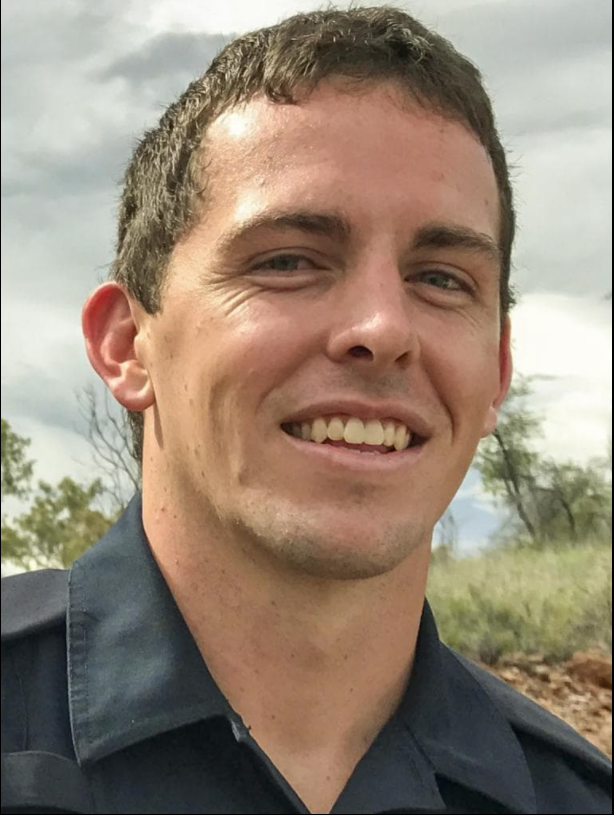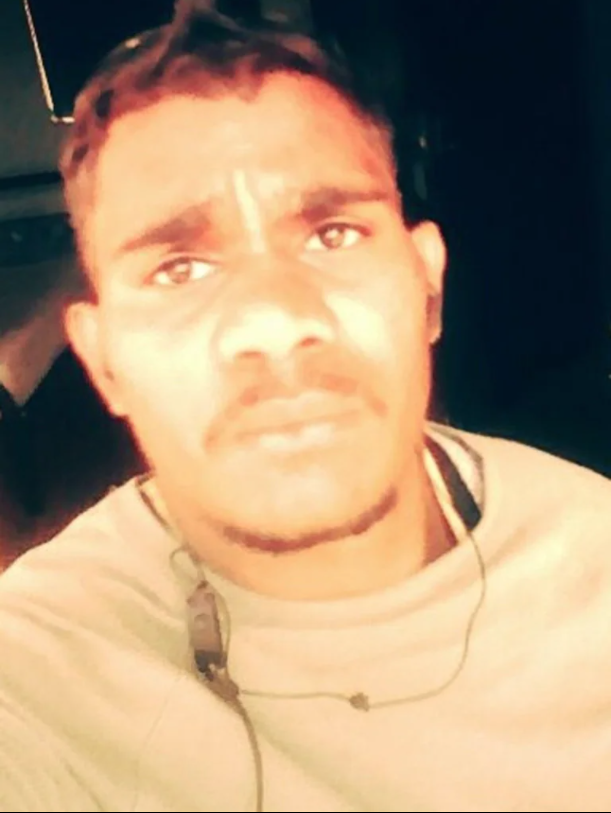Andrew L. Urban
A young white policeman in the Northern Territory, Zachary Rolfe, is facing trial this week (July 19, 2021) charged with the murder of a young Aboriginal man, Kumanjayi Walker. These words alone trigger preconceptions that will cloud any and all facts of the case that will emerge – and will be tested, torn to shreds or confirmed …. and incompletely reported in the media. Can you see the problem?

Zachary Rolfe
A decorated police constable, Rolfe killed Walker during a bungled 2019 arrest at Yuendumu, 300 kms from Alice Springs. The jury will have to decide whether in the seconds after Walker stabbed Rolfe, was shot once and wrestled to the ground, Rolfe could and should have done something other than shoot Walker twice more.
Walker was 19 when he died. One of the Red Centre’s troubled youth, he had breached bail and snuck home to attend a relative’s funeral. The police did not follow an understanding to wait until the next day to try to arrest him, something the local community regards as a mark of disrespect.

Kumanjayi Walker
How can the courts ensure that justice is not only done but is seen to be done when the public is only partly informed? The media doesn’t have the time or the space to report all the evidence presented, all the defence arguments and all the expert testimony – or the wherewithal to counter any racially tinged perceptions.
The highest profile murder case in the Northern Territory’s legal history, the Lindy Chamberlain case, remains a disturbing example of how the combustible confluence of public perception and the vexed matter of media coverage can drive the justice system into a black hole. Will the Rolfe case show that we (and the NT courts) have learnt from past mistakes?
In the Chamberlain case nearly 40 years ago, the facts were stranger than fiction: a dingo did take her baby. Never assume anything, is the best caution I have learnt in eight years of deep research into wrongful convictions. Two recent cases powerfully demonstrate that public opinion is not based on the evidence but the media-selected (prejudicial) aspects of it. In both cases, the public believes the accused are guilty. The evidence, as found in trial transcripts that show what was put to the relevant juries, does not support that view. In other words, the public holds views (often very firmly) that are based on malformed impressions. The only source of those impressions are of course media outlets.
This state of affairs is not entirely the media’s fault. The volume and complexity of evidence can be overwhelming, far beyond the capability or the capacity of journalists to digest and report in an accessible manner. Second, the public has considerable confidence in the administration of the law; if ‘they’ arrest, try and convict the accused, the accused is probably guilty. That confidence remains strangely undisturbed in the face of miscarriages of justice. Maybe that’s because it is unthinkable that the system can get it so wrong with such serious crimes.
In the Rolfe matter, there is the irresistible pull of race-coloured conclusions, fighting the immovable objective rule of law. Prior to the trial, Rolfe’s lawyers told the Darwin Supreme Court that some published comments had contained “significant inaccuracies” and are “mischievous and inflammatory”. It’s just the start …
Imagine how challenging it will be for the courts and the media to portray the trial and the verdict as fair & just – no matter what that verdict is. And no matter what the verdict is, the majority public perception will most likely be formed independent of it. That’s why it will be crucial for the court to ensure scientifically flawless forensic testimony and public access to as much of the evidence as possible. And I don’t envy the jury …

Rolfe might have been a genuine good bloke. The deceased might have been “iced” up where one bullet might not stop him. And no mention of where the first bullet struck.
If I was stabbed I would respond.
In my time in prison, when I was threatened even before I got to prison, in the truck, by a stabbing murderer who attempted to intimidate me in the showers.
I made an oath to myself. If anybody attacks me, I will do my best to kill them how ever I can. That is my truth. But I wasn’t a normal convict. Imprisoned for playing a guitar in a public place.
I met bad men in prison, but bad men put me there.
I believe the current stance is, “ Cannot comment on this as it is before the courts”. Bearing in mind there is a lot of emotion involved in this case Andrew, I would suggest to readers to be careful not to add to their emotional experiences while it is a court. It may be a trial matter of concern. There is a lot at stake here. I would recommend commentary be curtailed until all evidence has been provided and I do believe in this case that unlike Sue Neill-Frasers trial, circumstantial evidence, if at all, by the police will be under the microscope at all times. There are many opinions about policing in the Territory and it is not an easy job. There are grave concerns about weapons, including guns in the communities. I’m saying that the circumstances of this case does not need opinions from those outside of the Territory. People will need to have lived or worked in an aboriginal community to fully understand the circumstances of this case. There are grieving people on both sides who don’t need bush lawyers in this instance. Leave it to the professionals, all round. There will be lots of time for comment after the decision.
Knife versus gun? There is only one outcome and we have that. The guy with the knife lost. Why is Urban referring to a bungled arrest?
The media work with the police. If they do not cooperate on ‘this’ story they wont get the next one.
On a positive note Rolfe is going to trial to prove his innocence. His defence will be self defence which should stand up.
Rolfe was attacked and stabbed. There is not much of a case.
The problem will be if Rolfe is found guilty.
I question whether this case should even be going to trial especially in this liberal new age era. Anything could go wrong. The last thing we want is for something to go wrong and Rolfe found guilty. That would of course involve an appeal.
There is not much in the above story to really comment on.
I dont see what Urban is trying to say when he refers to the justice system as being driven into a black hole.
The big question is, will the liberals decide against Rolfe to prove they are true lefties siding with colour against White.
Based upon the scant information provided above I would be nervous for Rolfe.
When a police officer has been stabbed it cant be anything other than self defence.
The Chamberlain case was not a mistake. It was a monumental screw up.
Zachary Rolfe’s barrister is David Edwardson from Perth, who made a comment on this website when he was Scott Austic’s barrister.
Murder by a police officer claiming self defence; is that the question?
I couldn’t read the report in depth, I skimmed.
I do know some police officers have total disregard for the law and their duty.
I also know; years ago something was said; when they are dead they can’t give evidence.
Sadly, the policing conglomerates/forces that infest our once proud nation are now seen as but a last stop haven for cowards and narcissists, with under educated and under skilled members that could only be comparable to outlaw motorcycle gangs, the evidence of the last century confirms, I strongly concur. Deceitful liars, that through the excessive influences of their representative organisation have devalued and regressed Australia morally and humanely to such a degree, that nationally they are looked upon as a repugnant reflection of the lowest of the worst. All of the self acclaimed bravery is an unadulterated misnomer, and the inhouse promotions and decorations are as fanciful as is the imaginations of the policing organisations themselves that they are infallible and an asset to the general community. The average Australian would no more abrogate the responsibility of their long term welfare to such a pitiable organisation if there was a legal alternative. Drongos decorated with tats, wearing guns, cemented into a cowardly culture of thuggery and bullying, do not deserve to be acclaimed as protectors of society when in daily court proceedings across our nation confirm the cultures of venality and cowardice that have prevailed for in excess of a century. Disarm them, or allow the community to have the right to protect themselves equally.
There is the rank scent of a “Kangaroo Court” already in the air. Do you think anyone else in this case knows what it is like to put their own life on the line in pursuit of protecting the public? Do you suppose any one person apart from the decorated, courageous police officer in this case knows what it is like to have an assailant stab you and thus fear you might be within seconds of losing your life? I wonder if they will be asked to close their eyes and try to imagine what they would do if they found themselves in the brave policeman’s precarious position? What a hypocritical, farcical situation it would be if a brave police officer were punished for doing the job he is trained to do as part of his duty to protect the public!
You seem to be spruking much of the delusional deceit that is fundamentally at the core of much of the problem communities have with our venal policing forces Brian. Protecting the public? Give us a break! Just a cowardly attempt to slink into a supposedly safer, secure job. I distinctly recall in our nations history, and during the conscription years of the Vietnam War era, one of the by products of young adult male conscription was that Australia did not suffer any shortages of either policing officers, or male school teachers. Bravery in the extreme to be in a then sort after, protected job. The intellect and cowardice has not altered since those days, if the evidence of cowards and corrupt police in docks, in courts, is investigated and considered, I strongly believe.
You know that there is going to be a controversial case when a policeman is charged with murder within four days of the event. In the days prior to the charge, the Chief Minister stood up in front of the community and told them “consequences will flow” and the head of ICAC told them that “black lives matter”.
The deceased was on bail, had assaulted health staff who had to be evacuated and threatened them with an axe.
Rolfe knew he was going into a dangerous environment and in the course of his duty was stabbed.
A top policeman was tasked with assessing the investigation and when he found evidence which did not fit with the prosecution case, was told to cease his assessment.
The whole thing reeks of political interference in an attempt to appease the indigeneous constituency.
I recommend reading a number of articles written by Matt Cunningham from Sky News about this, very illuminating.